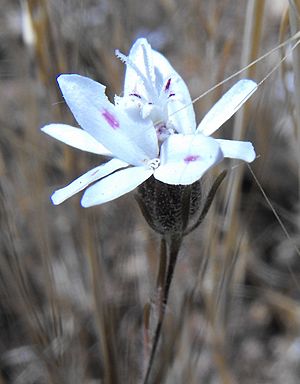False rosinweed facts for kids
Quick facts for kids False rosinweed |
|
|---|---|
 |
|
| Scientific classification | |
| Kingdom: | |
| (unranked): | |
| (unranked): | |
| (unranked): | |
| Order: | |
| Family: | |
| Genus: |
Osmadenia
Nutt.
|
| Species: |
O. tenella
|
| Binomial name | |
| Osmadenia tenella Nutt.
|
|
| Synonyms | |
|
|
False rosinweed (Osmadenia tenella) is a special type of flowering plant. It belongs to the daisy family, which is a very large group of plants. This plant is the only species in its group, called a genus, named Osmadenia.
Where False Rosinweed Grows
This plant naturally grows in Southern California and Baja California in Mexico. You can find it in coastal areas, hills, and canyons.
It is not a very common plant in these areas. It prefers certain habitats, like the coastal sage and mountain chaparral regions.
What False Rosinweed Looks Like
The false rosinweed is an annual plant. This means it grows from a seed, flowers, produces seeds, and then dies all within one year.
It is a hairy and sticky plant that smells nice. Its stem can grow up to 40 centimeters (about 16 inches) tall. The stem has thin, thread-like branches. Its leaves are long and narrow, with the biggest ones found lower on the plant. These can be up to 5 centimeters long.
Flowers and Seeds
The plant's flowers grow in small groups called cymes. Each group has several flower heads.
Each flower head has 3 to 5 ray florets. These look like petals and are usually white or slightly pink. They often have a pink spot. There are also several narrower disc florets in the center of the flower head.
After the flowers bloom, they produce small fruits called achenes. The achenes from the disc florets have a feathery top called a pappus. This helps them spread their seeds.

